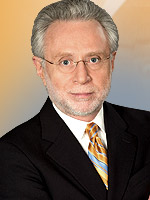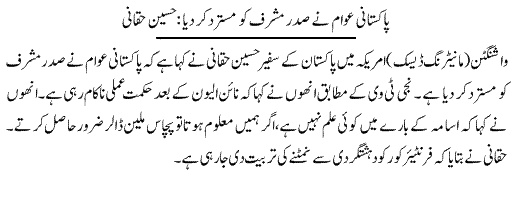
Late Edition

Husain Haqqani: Pakistani Ambassador to U.S
"Late Edition with Wolf Blitzer" is CNN's live newsmaker interview program hosted by veteran reporter Wolf Blitzer. The program is "the last word in Sunday talk" and a prime source for front-page news on Monday morning. "Late Edition" offers a superior combination of thorough interviews with top newsmakers and expert discussion. Wolf Blitzer interviews top newsmakers and world leaders on the major stories in the news each week. 
June 8, 2008
BLITZER: You can watch Fareed's full interview with Henry Kissinger right after LATE EDITION at 1:00 p.m. Eastern. Fareed Zakaria GPS that airs right after our show. Just ahead, there is deep concern a key U.S. ally isn't doing enough to fight al Qaeda. The Pakistani ambassador of the United States, Husain Haqqani, he's here. He's going to tell us where things stand and what is going on right now, the implications enormous. LATE EDITION continues right after this.
(COMMERCIAL BREAK)
BLITZER: We're standing by to speak live with Senators Dianne Feinstein and Kay Bailey Hutchison. We'll get Senator Feinstein's eyewitness account of that secret meeting between Barack Obama and Hillary Clinton, Thursday night at her house. That's coming up shortly. They're both standing by live.
First though, some important news out of Afghanistan. The first lady, Laura Bush, made a surprise stop in the country today. During her nine-hour visit, she met with the Afghani president, Hamid Karzai, as well as U.S. troops and Afghan women who are training to become police officers.
Terrorism remains a major problem for Afghanistan, as well as its neighbor Pakistan. Husain Haqqani is Pakistan's brand new ambassador to the United States. He just presented his credentials to President Bush this week.
Mr. Ambassador, thanks very much for coming in.
HAQQANI: Pleasure being here, Wolf.
BLITZER: Your president, President Musharraf, spoke out yesterday. And amid all these rumors he's thinking of stepping down, leaving the country, he said this -- he said, "I am not tendering resignation now. I don't have a house outside of Pakistan, and I don't want one."
What's going on with the president, Pervez Musharraf?
You've been -- obviously, in your earlier life -- quite critical of him.
HAQQANI: Well, February 18th, Pakistanis went to the polls. Pakistanis repudiated him and his policies, at least the domestic ones.
He is still president. Pakistan's new parliament, under the constitution, will take care of the matter. They will decide what to do about President Musharraf and what to do about all aspects of policy in Pakistan. BLITZER: You were a close ally of the late Benazir Bhutto, the former prime minister of Pakistan. What do you think Pakistan should do with President Musharraf? HAQQANI: I think that the theme of Benazir Bhutto was always reconciliation. I don't think that General Musharraf should be pushed out. I think, at the same time, General Musharraf also needs to show statesmanship. Pakistanis need to come together.
We have big problems, economic problems and, above all, the problem of terrorism, which Ms. Bhutto felt very strongly about.
So I think the time has come for a negotiated settlement about restoring Pakistan's constitution and allowing the political processes to continue.
BLITZER: Do you believe -- and you've studied this about as closely as anyone -- that Osama bin Laden is hiding out in those tribal areas in Pakistan along the border with Afghanistan?
HAQQANI: Wolf, if I knew where Osama bin Laden was, I would collect the $50 million reward on his head.
The point is there has been tremendous failure in chasing after Osama bin Laden since Tora Bora. An opportunity was missed then. And after that, the Pakistani intelligence service, the Afghan intelligence service, and the U.S. intelligence service haven't shared intelligence the way they should.
Once they're able to do that; once all the doubts about each other are out of the way, I'm sure we will get to Osama bin Laden, whether in Afghanistan or in Pakistan's tribal areas.
BLITZER: Are you suggesting that the U.S. intelligence community is not helping Pakistan enough in going forward in this hunt, that they're not sharing information with your intelligence or military services?
HAQQANI: I'm suggesting no such thing, Wolf. All I'm saying is that there has to be real-time cooperation between the intelligence services of the United States, Afghanistan, and Pakistan. And that alone will get Osama bin Laden and all his cohorts.
BLITZER: You know, there's an election going on in this country right now. I'm sure you're familiar with that.
Senator Barack Obama said this last August -- last summer. I want to play this little clip for you.
HAQQANI: Sure.
(BEGIN VIDEO CLIP)
OBAMA: There are terrorists holed up in those mountains who murdered 3,000 Americans. They are plotting to strike again. It was a terrible mistake to fail to act, when we had a chance to take out an Al Qaida leadership meeting in 2005. If we have actionable intelligence about high-value terror targets, and President Musharraf will not act, we will.
(END VIDEO CLIP)
BLITZER: All right. And President Bush, as you know, has said exactly the same thing. What do you say?
HAQQANI: I say that the government of Pakistan, the new elected government of Pakistan that has, as its conviction, an opposition to terrorism -- we went to the polls asking the people to vote for us because we oppose terrorism. We lost our leader, Benazir Bhutto, in the process, to terrorism.
Therefore, we are committed to acting on actionable intelligence ourselves. The moment we have actionable intelligence, Pakistan will act, in partnership with the United States, in partnership with Afghanistan.
BLITZER: But, as you know, there are elements of the Pakistani intelligence service, even the Pakistani military, that the U.S. doesn't trust, right now, to give you that kind of sensitive information, for fear it would wind up in the wrong hands.
You're familiar with that concern that the U.S. government has?
HAQQANI: And my job, Wolf, is to reassure the United States that there's a new sheriff in town, in Islamabad, and that that sheriff wants to work with the United States, cooperatively and with conviction, a firm commitment to ending terrorism in all its forms and making sure that Pakistan and Afghanistan and the United States are all partners in the war against terror.
BLITZER: Here's John McCain, speaking last January on this very same subject. Listen to this.
(BEGIN VIDEO CLIP)
MCCAIN: We know that Pakistan is now a very dangerous situation, and why, because Pakistan is nuclear armed; because there's a threat of radical Islamic extremism; and more importantly, it's right next to Afghanistan, where we have thousands and thousands of brave young Americans in harm's way.
My friends, I can tell you that the Taliban are not defeated.
(END VIDEO CLIP)
BLITZER: All right. What would you tell Senator McCain, right now, if you had the chance, about this new government in Pakistan and your commitment to finally getting the job done?
HAQQANI: Well, the most important thing is that no strategy was formulated to fight terror, after 9/11, in Afghanistan and Pakistan.
We are in the process of formulating a strategy. You started your show with a comment about having various tactical moves, Henry Kissinger remarking that various tactical moves are not a strategy. We want to fight terrorism in the political dimension, the military dimension, intelligence, socioeconomic, as well as an ideological dimension.
And because we have the support of the people, I think we will succeed far better than a government that had to use its intelligence services to chase after political opponents.
BLITZER: One of the preeminent Pakistani journalists, Ahmed Rashid, wrote in The Washington Post, on Friday -- and I'm sure you saw the piece.
He wrote this. He said, "General Ashfaq Kiyani, chief of the Pakistani army, has told U.S. military and NATO officials that he will not retrain or reequip troops to fight the counterinsurgency war the Americans are demanding on Pakistan's mountainous western border."
And Rashid went on to write, "More than 80 percent of the $10 billion in U.S. aid to Pakistan since the September 11 attacks has gone to the military; much of it has been used to buy expensive weapons systems for the Indian front rather than the smaller items needed for counterinsurgency."
Is he right?
HAQQANI: He is not absolutely right. The fact remains that Pakistan's military does consider India to be the primary threat, and that's a historic reality.
But, at the same time, the Pakistani military has put in many, many people in the Afghan front, in the tribal areas. The new government is trying to create a new counterterrorism, with U.S. support, and we are training the frontier constabulary, which is a paramilitary force, primarily to fight terror in the tribal areas.
BLITZER: Husain Haqqani is the new Pakistani ambassador to Washington. Mr. Ambassador, welcome. Good to have you here. Thanks very much for coming in.
HAQQANI: Thank you very much, Wolf.
BLITZER: We hope you'll be a frequent visitor.
HAQQANI: I hope so, too.
--
Whiz News provides news, views and interesting articles from various sources and all perspectives.

|